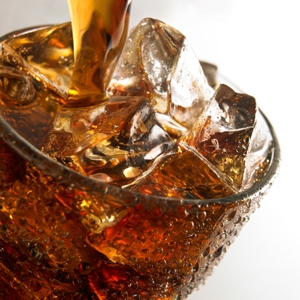That’s what I get for neglecting my clinical nutrition news sources for a few days… I looked in this morning for the first time since early last week only to find a raft of new studies on one of the most controversial foods of our time: Sugar. Following are the ones I found most compelling…
 Remember: Good old Water remains the cheapest, healthiest thing you can drink…
Remember: Good old Water remains the cheapest, healthiest thing you can drink…
Sugary Drinks linked to higher risk of heart disease
A team at the American Heart Association has discovered that consumption of more than 1 12 oz. / 355 ml serving (i.e.- 1 can of Soda) per day of Sugar-sweetened beverages, “is linked to lower levels of high-density lipoprotein cholesterol (HDL-C), (“good” cholesterol), and higher levels of triglycerides, in middle aged and older adults, both of which have been shown to increase risk of cardiovascular disease.”
Researchers analysed the medical records and self-reported food consumption statistics of 5,924 participants from the Offspring and Generation 3 cohorts of the Framingham Heart Study, who were followed for an average of 12.5 years between 1991 and 2014. Among their main findings:
- Drinking sugar-sweetened beverages (more than 12 ounces per day) was associated with a 53 per cent higher incidence of high triglycerides and a 98 percent higher incidence of low HDL cholesterol (the “good” cholesterol) compared to those who drank less than one serving per month. The Sugar-induced condition is called dislipidemia;
- Drinking low-calorie sweetened beverages did not appear to be associated with increased dyslipidemia risk among the people who regularly drank low-calorie sweetened beverages;
- Regularly drinking up to 12 ounces of 100 percent fruit juice per day was not associated with adverse changes in cholesterol or dyslipidemia, though further research is needed to warrant this finding.
“Reducing the number of or eliminating sugary drink consumption may be one strategy that could help people keep their triglyceride and HDL cholesterol at healthier levels,” said lead study author Dr. Nicola McKeown, of Tufts University in Boston. “And, while our study didn’t find negative consequences on blood lipids from drinking low-calorie sweetened drinks, there may be health consequences of consuming these beverages on other risk factors. Water remains the preferred and healthiest beverage.”
‘Sugar Tax’ on beverages has little impact in Phillie
A team from Drexel University in Philadelphia, PA, looked at the effects of a municipal ‘Sugar Tax’ on beverages after one year in effect. The results were anything but satisfactory.
Previous surveys attempting to gauge the effects of the Sugar Tax concentrated on sales figures for Suagr-sweetened beverages. Those studies found that one year after the tax, adults consumed fewer sugary beverages in Philadelphia relative to outside Philadelphia (about 10 fewer occasions per month) — that study focused on lower-income Philadelphians who lived with children and, on average, consumed a sugary beverage every day. But those studies did not look at the change in consumption of Sugary drinks.
For the new study, the Drexel team conducted a random phone survey of 515 adult residents of Philadelphia and the neighboring cities of Camden and Trenton, New Jersey, and Wilmington, Delaware. Respondents shared how much and how frequently they drink Soda, Fruit Drinks, Energy Drinks and Bottled Water during a 30-day period when the tax was first implemented, Dec. 2016 – Jan. 2017, and again reported their consumption over a 30-day period during a follow-up survey a year later in Dec. 2017-Feb. 2018.
At the one-year mark, 39 percent of Philadelphians and 34 percent of those in surrounding cities reported drinking fewer Sugar-sweetened beverages. But this amounts to only three fewer sugary beverages for Philadelphians each month – not a statistically significant difference.
“We have ample evidence that sugary beverages are connected to type 2 diabetes, obesity, cardiovascular disease, and other health issues, but we’re seeing that raising the price of sugary-beverages may not impact consumers who don’t drink a lot of soda,” said Study Co-author Dr. Amy Auchincloss.
“The availability of untaxed sugary beverages outside of Philadelphia, the still relatively lower price of these drinks compared to healthier ones and marketing and advertising may explain the low effect of the tax,” said Lead Author, PhD Student Yichen Zhong.
Sugar the most ‘important’ factor in consumer food choices
Researchers at Nottingham University in the UK wanted to see what consumers considered the most important food group to avoid when making their choices at the supermarket.
Using the Traffic Light Labelling System (TLL), they monitored choices of 858 volunteer ‘consumers’ in lab setting. The TLL system assigns healthiness ratings to foods using the familiar red-amber-green colour cues used nn traffic signals.
Participants in the study were shown three options of the same food item with different nutrition traffic light label combinations, this was repeated for three products: Prepacked Sandwiches, Breakfast Cereals and Cookies. They were then asked to select which they thought was the healthiest product.
Project Leader Dr. Ola Anabtawi notes: Foods with a high Sugar content were by far perceived to be the worst for health with participants avoiding these products, with Excess Fat, Saturated Fats and Salt being less off-putting. Products flagged with a red label were also avoided much more than those with a green label.
So… TLL labelling works, but the apparent awareness among consumers of the ills associated with Salt and Saturated Fats remains low – perhaps dangerously so.
And there you have it…
Sugar comes off looking badly again. But I don’t think any kind of new labelling or taxation scheme will have any significant effect on those who consume large amounts of Sugary beverages. They’re habituated and, like the fat guy sitting alone in the corner at McDonald’s scarfing 2 Big Macs and 4 Large Fries, they’ll rationalize away any negatives others may attach to their dietary choices.
Yes, folks: it’s human nature that’s the real problem.
~ Maggie J.

